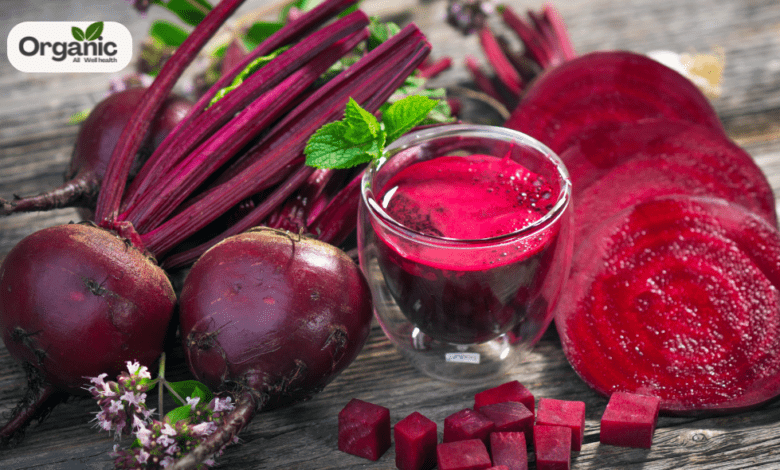Beetroot – The Superfood Your Body Needs for Optimal Health

Beetroot, with its deep red hue and earthy flavor, is no longer just a forgotten root vegetable tucked away on grocery shelves. It has emerged as a nutritional powerhouse, offering a multitude of health benefits that support everything from brain function to athletic performance. Whether juiced, roasted, or raw, beet-root is capturing the attention of health enthusiasts, nutritionists, and wellness brands alike.
In this in-depth guide created by the allwellhealthorganic review team, we’ll explore everything you need to know about beet-root—its nutritional profile, top benefits, ways to incorporate it into your diet, and precautions to keep in mind. Let’s discover why this vibrant vegetable deserves a place in your daily diet.
What is Beetroot and Why is it So Popular?
Beetroot, also known as the table beet, garden beet, or red beet, is the taproot portion of the beet plant. Traditionally used in various culinary dishes around the world, beet-root has recently gained fame due to scientific studies backing its health benefits. From enhancing stamina to aiding detoxification, beet-root’s uses go far beyond traditional cooking.
The rise in popularity can be attributed to its:
- High nutrient content
- Natural detoxifying compounds
- Use in natural food coloring
- Reputation as a natural performance enhancer
Nutritional Profile of Beetroot – What’s Inside This Vibrant Veggie?
Key Nutrients in Beetroot (Per 100g Cooked)
According to the USDA, beet-root is packed with:
- Calories: 43 kcal
- Carbohydrates: 9.6g (with 2.8g fiber)
- Protein: 1.6g
- Fat: 0.2g
- Folate (Vitamin B9): 20% of Daily Value (DV)
- Manganese: 14% of DV
- Potassium: 9% of DV
- Vitamin C: 4% of DV
- Iron: 4% of DV
- Nitrates, Betalains, and Antioxidants
These nutrients contribute to a wide range of beetroot benefits that support overall well-being.
Top 10 Health Benefits of Beetroot Backed by Science
1. Beetroot Improves Heart Health
One of the most studied aspects of beet-root is its ability to support cardiovascular health. Rich in dietary nitrates, beet-root helps produce nitric oxide in the body, which relaxes and dilates blood vessels.
Key Effects:
- Lowers blood pressure
- Improves circulation
- Reduces the risk of heart attack and stroke
Studies have shown that consuming beetroot juice daily may reduce systolic and diastolic blood pressure significantly.
2. Boosts Athletic and Physical Performance
Athletes love beetroot juice for a reason. The nitrates improve the efficiency of mitochondria—the cell’s energy powerhouse—allowing for better oxygen usage.
Benefits include:
- Increased stamina
- Reduced muscle fatigue
- Enhanced endurance during exercise
This is why many pre-workout supplements now include beet-root extracts as a primary ingredient.
3. Aids in Digestion and Gut Health
With nearly 3g of fiber per serving, beet-root aids in digestion by:
- Preventing constipation
- Promoting healthy gut bacteria
- Reducing bloating
Beetroot’s combination of fiber and antioxidants supports overall gastrointestinal health.
4. Enhances Brain Function and Cognitive Health
Nitric oxide generated from beet-root nitrates also improves cerebral blood flow, especially in the frontal lobe—the area associated with decision-making and memory.
Potential advantages:
- Improved mental clarity
- Lower risk of dementia
- Better cognitive performance in aging adults
Including beet-root in your diet may protect your brain over the long term.
5. Supports Healthy Skin and Anti-Aging
Beet-root contains vitamin C, antioxidants, and anti-inflammatory agents that promote glowing skin and reduce signs of aging.
How it helps:
- Fights free radicals
- Promotes collagen production
- Reduces acne and pigmentation
When applied as a mask or consumed regularly, beet-root can significantly improve skin health.
6. Regulates Blood Sugar Levels
Though slightly sweet, beet-root has a low glycemic index and can help regulate blood sugar.
Why it works:
- High fiber content slows glucose absorption
- Improves insulin sensitivity
- Aids in diabetes management
Diabetics can enjoy beet-root in moderation as part of a balanced diet.
7. Natural Detoxification and Liver Health
Betalains—pigments found in beet-root—support liver function by aiding detoxification.
Benefits for the liver:
- Neutralizes toxins
- Supports bile production
- Protects against fatty liver disease
Allwellhealthorganic encourages incorporating beet-root into your detox plan for a gentle, natural cleanse.
8. Fights Inflammation
Beetroot’s betalains have anti-inflammatory properties, which help combat chronic inflammation linked to:
- Arthritis
- Cardiovascular diseases
- Obesity
- Cancer
Daily beet-root intake can help maintain your body’s inflammatory response in check.
9. Aids Weight Loss and Metabolism
Beetroot is low in calories and high in fiber, making it ideal for weight management.
Metabolism boosters in beetroot:
- Betaine: Supports fat breakdown
- Nitrates: Improve exercise performance
- Fiber: Promotes satiety and curbs cravings
Adding beet-root to meals helps maintain a calorie deficit while fueling your body.
10. Strengthens the Immune System
Beetroot’s vitamin C, iron, and zinc content make it a fantastic natural immunity booster.
How it supports immunity:
- Enhances white blood cell production
- Fights off infections
- Improves healing
Especially during cold and flu seasons, a beet-root smoothie or salad can give your body the extra protection it needs.
Ways to Eat and Enjoy Daily
1. Raw Beetroot Salad
Grated raw beet-root mixed with carrots, lemon, and mint makes a crunchy and detoxifying salad.
2. Roasted Beetroot
Roasting enhances beet-root’s natural sweetness—perfect as a side dish or salad topper.
3. Beetroot Juice
Blend with apple, ginger, or carrot for a vibrant and refreshing juice loaded with health perks.
4. Beetroot Smoothie
Combine with berries, banana, and yogurt for a delicious, antioxidant-rich breakfast.
5. Beetroot Soup (Borscht)
A popular Eastern European dish, borscht is hearty, tangy, and immune-boosting.
6. Pickled Beetroot
Preserve beet-root slices in vinegar for a tangy addition to burgers, wraps, or rice bowls.
Potential Side Effects of Beetroot to Consider
While beet-root is generally safe, a few cautions should be noted:
1. Beeturia
Some people experience red or pink urine after eating beet-root. It’s harmless but can be alarming.
2. Kidney Stones Risk
Due to high oxalate content, excessive beet-root intake may contribute to stone formation in sensitive individuals.
3. Low Blood Pressure
Beetroot may overly lower blood pressure for those already on medication or with hypotension.
4. Staining
Beetroot can stain hands, clothes, and even kitchenware—so handle with care!
Why the allwellhealthorganic Team Recommends Beetroot
At allwellhealthorganic, we believe that true wellness comes from natural and nutrient-rich foods. Beet-root fits perfectly into our philosophy due to its:
- Scientifically supported benefits
- Versatile usage in recipes
- Accessibility and affordability
Whether you’re an athlete, a wellness enthusiast, or simply looking for a delicious way to improve your health, beet-root deserves your attention.
Final Thoughts – Add Beetroot to Your Plate Today!
Beetroot is not just a pretty veggie—it’s a nutritional gem. From enhancing heart health and boosting brain function to aiding weight loss and improving skin, its benefits are wide-ranging and scientifically proven.
Incorporating beet-root into your daily meals doesn’t have to be complicated. Start with a beet-root salad, a smoothie, or a roasted side dish, and see how your body responds to this vibrant superfood.
Backed by research and ancient wisdom, beet-root remains a timeless ally in the journey toward holistic health. And with insights from the allwellhealthorganic review team, you can feel confident making beet-root a staple in your wellness plan.
Disclaimer: This advice is for general informational purposes only. It is not a substitute for professional medical advice. Always consult an expert or your own doctor for more information. AllwellHealthOrganic is not responsible for the accuracy of this information.



